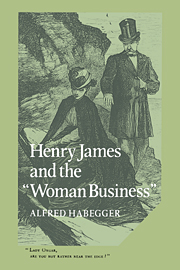Book contents
- Frontmatter
- Contents
- Acknowledgments
- Abbreviations
- 1 Introduction
- 2 The Lessons of the Father: Henry James, Sr., on Sexual Difference
- 3 Precocious Incest: First Novels by Louisa May Alcott and Henry James
- 4 The Chains of Literature: Elizabeth Stoddard and Henry James
- 5 Anne Moncure Crane Seemuller: Henry James's Jocasta
- 6 Minnie Temple's Death and the Birth of Henry James's Imagination
- 7 The Fatherless Heroine and the Filial Son: Deep Background for The Portrait of a Lady
- 8 The Return of the Father in The Bostonians
- 9 Conclusion
- Notes
- Works Cited
- Index
8 - The Return of the Father in The Bostonians
Published online by Cambridge University Press: 04 November 2009
- Frontmatter
- Contents
- Acknowledgments
- Abbreviations
- 1 Introduction
- 2 The Lessons of the Father: Henry James, Sr., on Sexual Difference
- 3 Precocious Incest: First Novels by Louisa May Alcott and Henry James
- 4 The Chains of Literature: Elizabeth Stoddard and Henry James
- 5 Anne Moncure Crane Seemuller: Henry James's Jocasta
- 6 Minnie Temple's Death and the Birth of Henry James's Imagination
- 7 The Fatherless Heroine and the Filial Son: Deep Background for The Portrait of a Lady
- 8 The Return of the Father in The Bostonians
- 9 Conclusion
- Notes
- Works Cited
- Index
Summary
As James takes us through The Bostonians, he favors us from time to time with unequivocal declarations about the inner nature of his fictive people. These disclosures present themselves as absolutely unquestionable judgments or analyses – revealed truths guaranteed by the author. “In reality,” we are told, “Olive was distinguished and discriminating, and Adeline was the dupe of confusions in which the worse was apt to be mistaken for the better” (194). In Basil's “false pride,” James informs us, “there was a thread of moral tinsel, as there was in the Southern idea of chivalry” (320). Assessing Verena's devotion to Olive, he says that “at least a portion of her nature turned with eagerness” (138) to the older woman's guidance, in this way implying that the magnetism is real yet somehow not wholehearted. In such passages James steps forward, very briefly, as god of the novel, displaying an omniscience that is able to discriminate among the threads that make up his characters.
Inevitably, authorial intrusions or comments have great specific gravity. They stand out, make special claims to veracity and importance, play a leading role in guiding our understanding and interpretation. Less obviously, the manner in which a novel's creator breaks into his or her creation discloses some powerful secrets about its hidden constitutive principles. James speaks out in The Bostonians far more often than in his other narratives, and yet, contrary to the impression his more sweeping authorial pronouncements convey, he does not display a steady, unruffled, all-surveying mastery.
- Type
- Chapter
- Information
- Henry James and the 'Woman Business' , pp. 182 - 229Publisher: Cambridge University PressPrint publication year: 1989



